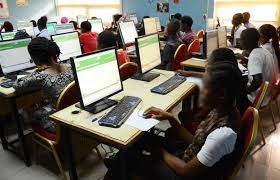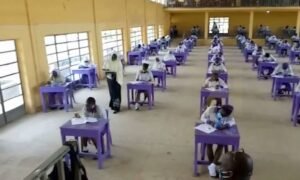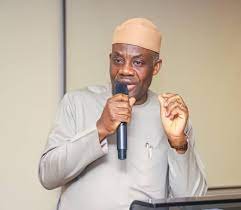In a recent cabinet reshuffle, President Bola Ahmed Tinubu appointed Dr. Olatunji Alaussa as the new Minister of Education, following the dismissal of Prof. Tahir Mamman and four other cabinet members on October 23. The Education sector was entangled in challenges and controversies over the past the one year that marked Mamman’s tenure.
President Tinubu stated that the dismissal of Mamman was “long overdue,” pointing to multiple issues that had arisen under his leadership. But can Alaussa, a former minister of State for Health make the desired progress for the sector and bring the nation’s education back to its glory? In this write-up Sultan Aderinsola and Umar Muaz ask pertinent questions as he begins his change mission.
Misinformation leading to Diplomatic conflict
There was a diplomatic dispute involving Nigeria, Benin Republic, and Togo regarding degree recognition. This misunderstanding resulted in the suspension of degree programs from universities in Benin and Togo, disrupting the academic trajectories of many Nigerian students studying in these countries.
Denial of NYSC scheme to foreign students
Mamman’s policies affected foreign-educated Nigerian graduates who were denied participation in the National Youth Service Corps (NYSC) scheme, effectively blocking thousands from fulfilling a mandatory requirement for Nigerian graduates. This policy was widely criticized by students and their families and is one of the key issues the new minister is expected to address.

Unsolved Admission Age Conflicts
Mamman’s tenure also saw conflicts among major educational bodies, including the National Board for Technical Education (NBTE), the National Universities Commission (NUC), the NYSC, and the Joint Admissions and Matriculation Board (JAMB). The lack of coordination between these agencies led to graduates being excluded from professional exams and NYSC registration.
Implementation of 18year old minimum age into universities

The former minister’s introduction of an 18-year minimum age policy for university admissions sparked backlash which resulted to a lawsuit against the ministry. The policy was criticized for potentially denying access to young, high-achieving students and for failing to account for the diversity of students’ academic journeys.

With Tunji Alaussa’s appointment, it is anticipated that he will tackle pressing issues, restore stability within the ministry, and improve coordination among educational institutions. He is expected to overhaul outdated policies from the previous administration that have caused significant inconvenience and conflicts between bodies within the sector. As education is one of the cornerstones of Nigeria’s development, strategic reforms are anticipated to address the inherited challenges, positioning the sector for positive transformation.
As a seasoned nephrologist and healthcare professional, Dr. Alausa brings over three decades of experience in internal medicine, particularly nephrology, to his new role.
Profile
Dr. Alausa hails from Epe, Lagos State, and graduated in Medicine and Surgery from the University of Lagos in 1993. He furthered his education with residencies at Cook County Hospital in Chicago, Royal Bolton Hospital, and the University of Newcastle.
Before becoming the Minister of Education, Dr. Alausa served as the Minister of State for Health and Social Welfare, appointed on August 21, 2023. His medical career spans various institutions, including Rush University Medical School, where he was an assistant professor, and the Medical College of Wisconsin, where he specialized in Nephrology and Hypertension.
President Tinubu’s cabinet reshuffle led to Dr. Alausa’s appointment as Minister of Education, replacing Prof. Tahir Mamman. This change aims to bring a fresh approach to educational policies and reforms, addressing key issues within Nigeria’s academic sector.
The new Nigerian Minister of Education, Dr. Morufu Olatunji Alausa, faces significant challenges due to his lack of experience in the education sector. As a US-based Nephrologist with 28 years of experience abroad, he may struggle to understand the intricacies of Nigeria’s education system.
First Line Tasks to Establish Full Control
- Renegotiation of the 2009 ASUU-FG Agreement: The lecturers are determined to renegotiate the agreement, which is 12 years overdue. Dr. Alausa’s lack of familiarity with the education sector may hinder his ability to address this critical issue effectively.
- Collapsing Secondary Education System: Nigeria’s education system is in crisis, with 10.5 million children out of school, the highest rate in the world. Dr. Alausa needs to develop a deep understanding of the system’s complexities to implement meaningful reforms.
- Socio-political Dynamics: The education sector requires someone who understands the socio-political dynamics surrounding student and faculty welfare, which have been repeatedly neglected.
Key Areas to Address
- Transformative Leadership: Dr. Alausa needs to demonstrate transformative leadership, with an in-depth understanding of pedagogical practices, teacher training, curriculum development, and educational infrastructure.
- Expertise in Education: The sector requires expertise, not prescriptions. Dr. Alausa should surround himself with experienced education professionals to ensure informed decision-making.
- Understanding the Nigerian Context: Dr. Alausa must quickly grasp the socio-political dynamics of the Nigerian university system and the challenges facing the education sector.
Recommendations
- Collaborate with Education Experts: Dr. Alausa should assemble a team of experienced education professionals to provide guidance on key issues.
- Conduct a Thorough Sector Analysis: A comprehensive analysis of the education sector will help Dr. Alausa identify areas requiring immediate attention.
- Develop a Clear Reform Agenda: Dr. Alausa should create a well-structured reform agenda, addressing the renegotiation of the ASUU-FG Agreement, improving teacher training, and enhancing educational infrastructure.
By taking these steps, Dr. Alausa can begin to address the challenges facing Nigeria’s education sector and demonstrate his commitment to meaningful reform.



